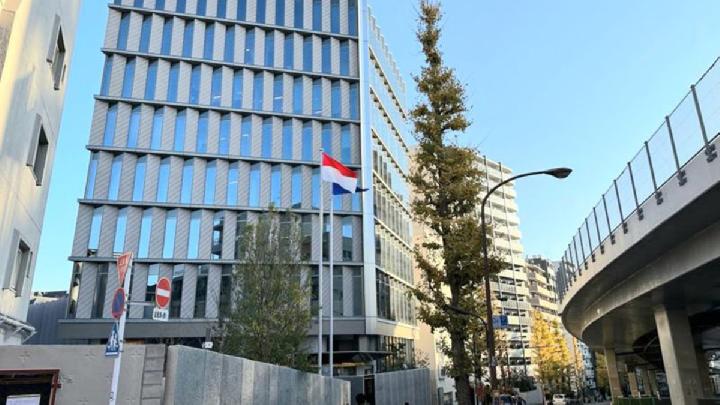British tennis player Tara Moore has received a four-year doping ban after returning a positive test in 2022 - 18 months after she was initially cleared of the offence by an independent tribunal.
The 32-year-old was first sanctioned three years ago after banned substances nandrolone and boldenone were found in positive tests Moore underwent during a tournament in Bogota, Colombia in April 2022.
After receiving an immediate ban following month, Moore - a former British No1 doubles player - was forced to wait for 19 months for the tribunal to rule that the anabolic steroids had entered her bloodstream via contaminated meats eaten in the days before her initial urine test.
Moore shared a heartfelt statement in the wake of the decision as she decried the '19 months of lost time' that waiting for the hearing's verdict that she 'bore no fault or negligence' had stolen from her.
Since returning to the tour in April 2024, Moore has frequently spoken out against what she believed was preferential treatment shown to Iga Swiatek, who was handed a one-month suspension after she tested positive for trimetazidine via contaminated melatonin.
But Moore will now face an extended spell on the sidelines which could bring a premature end to her career after the Court of Arbitration for Sport upheld the International Tennis Integrity Agency's appeal into the initial hearing verdict.
Tara Moore has been handed an immediate four-year doping ban after Cas upheld an appeal against the British player
Once British No1 in doubles, Moore will now have to wait until 2028 to return to competition
'After reviewing the scientific and legal evidence, the majority of the Cas panel considered that the player did not succeed in proving that the concentration of nandrolone in her sample was consistent with the ingestion of contaminated meat,' a Cas statement read.
'The panel concluded that Ms Moore failed to establish that the ADRV (Anti-Doping Rule Violation) was not intentional. The appeal by the ITIA is therefore upheld and the decision rendered by the Independent Tribunal is set aside.'
Moore's second suspension will be effective immediately, but reduced to 19 months due to previous time served.
The verdict from Cas' March hearing into the appeal now means that the British player will be unable to return to competition until the start of the 2028 season.
ITIA chief executive Karen Moorhouse stressed that the decision to appeal the initial verdict was 'not taken lightly'.
'In this case, our independent scientific advice was that the player did not adequately explain the high level of nandrolone present in their sample,' she continued. 'Today's ruling is consistent with this position.
'We understand that players and their support teams may have questions about this decision, and we will answer these fully once we have reviewed the details of the ruling.'
Moore is believed to have filed a cross-appeal at Cas in a bid to dismiss the ITIA appeal, but this was declared inadmissible by the Swiss court.
Moore's case had been held up as an example by some of perceived unfairness in how the cases of Jannik Sinner and Iga Swiatek were handled compared to lower-ranked peers
Moore's 'no fault or negligence' verdict is not without precedent, with Colombian doubles star Robert Farah successfully arguing that he had been contaminated by meat eaten in his home country after returning a positive result for boldenone.
But Moore's second verdict will continue to keep anti-doping measures and the process of handling doping cases at the top of the tennis agenda after months of debate around both Swiatek and world No1 Jannik Sinner's positive tests.
Sinner was handed a three-month suspension earlier this year after the World Anti-Doping Agency appealed the initial verdict that Sinner bore 'no fault or negligence' after clostebol entered his body via a cut on the hand of his physio that had been treated with the banned substance.
Debate swirled over the perceived leniency of his punishment, which for Sinner to return in time to compete at the French Open - where he reached the final - without missing any Grand Slam tournaments.
Swiatek was similarly subject to debate over special treatment after the former world No1 was handed her month-long suspension in November 2024 - having competed in tournaments after August's positive test.
Both Sinner and Swiatek were victorious in SW19 last weekend, with the Italian claiming his first Wimbledon Championship and Swiatek her sixth Grand Slam title.

 3 months ago
56
3 months ago
56
















































